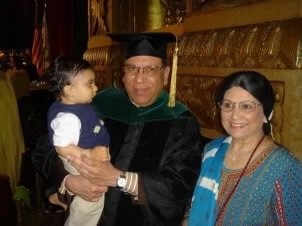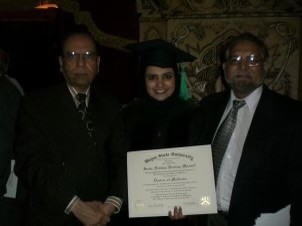Dermatology lectures continue Dr. Syed Latafat Husain Hamzavi’s humanist legacy
“I was born in India, went to medical school in Pakistan and trained in Scotland, but it was in America and in Port Huron and Detroit that I found a home."
 Iltefat Hamzavi, M.D., Res. ’00, recalled his late father, Wayne State University School of Medicine Clinical Professor Syed Latafat Husain Hamzavi, M.D., Ph.D., using these words to describe his journey through periods of uncertainty before developing a sense of purpose and mission. To ensure his legacy continues, the Hamzavi family has established the S. L. Husain Hamzavi, M.D. and Aquela F. Hamzavi, M.D. Endowed Lectureship in the Department of Dermatology, which will feature annual presentations from dermatology experts examining the field through a range of lenses that include geography, race and culture.
Iltefat Hamzavi, M.D., Res. ’00, recalled his late father, Wayne State University School of Medicine Clinical Professor Syed Latafat Husain Hamzavi, M.D., Ph.D., using these words to describe his journey through periods of uncertainty before developing a sense of purpose and mission. To ensure his legacy continues, the Hamzavi family has established the S. L. Husain Hamzavi, M.D. and Aquela F. Hamzavi, M.D. Endowed Lectureship in the Department of Dermatology, which will feature annual presentations from dermatology experts examining the field through a range of lenses that include geography, race and culture.
“My father really believed that dermatology could touch all people,” Iltefat said. “So, we’re going to have a section on multicultural and skin-of-color dermatology. He also worked in a rural community, so we would like discussions on how to provide care in rural areas. We hope the Hamzavi Lecture brings in broad speakers because my father was a broad speaker interested in so many topics. He was a Ph.D., so we would like some lectures to be on advanced science. We also would like to feature a Wayne State alum every few years.”
Exploring these topics, Iltefat said, echoes his father’s belief that healthcare transcends societal divisions. When Dr. Hamzavi was a child in India, the conflict between Hindu and Muslim factions led his family to flee their family’s New Delhi home. Experiencing prejudice and poverty at such a young age, he became determined to contribute to a compassionate community, crossing the world to find it.
After receiving his medical degree from Liaquat Medical School in Pakistan, Dr. Hamzavi moved to Scotland to pursue his dermatology training and Ph.D. at the University of Glasgow, studying the use of zinc for the treatment of leg ulcers. In 1977, they relocated to Detroit, Michigan, to join renowned faculty researcher and dermatopathologist, Dr. Hermann Pinkus and Donald Birmingham in developing the Contact Dermatitis Unit at Wayne State University. Dr. Hamzavi began his residency at Wayne State in 1978, becoming one of the first South Asian and Muslim physicians to be certified by the American Board of Dermatology.
Fond memories of Dr. Pinkus and other colleagues inspired Dr. Hamzavi and his family to give to Wayne State philanthropically. The Hamzavi Foundation established the Peter J. Aronson, M.D. Endowed Lecture in 2012, in addition to significantly supporting the Hermann Pinkus, M.D. Endowed Chair. Expressing his gratitutde, Darius Mehregan, M.D., Hermann Pinkus Chairman of the Department of Dermatology, said, "Gifts like this from our generous alumni and their families allow us to continue our educational and research programs for the betterment of WSU students and our patients."
 By 1981, Dr. Hamzavi continued in his career as a part-time associate professor at the School of Medicine after he and his wife Aquela opened their own clinic, Hamzavi Dermatology, in Port Huron. Today, the practice has expanded to eleven locations across Southeastern Michigan and is led by their physician sons, Iltefat and Fasahat. It also manages Hamzavi Wellness and Psychiatry Center led by his daughter, Dr Asra Hamzavi.
By 1981, Dr. Hamzavi continued in his career as a part-time associate professor at the School of Medicine after he and his wife Aquela opened their own clinic, Hamzavi Dermatology, in Port Huron. Today, the practice has expanded to eleven locations across Southeastern Michigan and is led by their physician sons, Iltefat and Fasahat. It also manages Hamzavi Wellness and Psychiatry Center led by his daughter, Dr Asra Hamzavi.
Dr. Iltefat Hamzavi recalled how his father’s origins made him sensitive to the struggles of families in Detroit and Port Huron, where he made it a priority to hire low-income individuals and offer flexible working conditions to single parents.
“He knew how poverty limits opportunity. My parents invested in the Port Huron population, and my dad did the same thing at Wayne State,” Iltefat said. “He would go on rounds there every Wednesday, and then they would pay him to staff the VA Clinic and he would always donate that fee back to the Department of Dermatology.”
Dr. Syed Latafat Husain Hamzavi's legacy includes the patients and families he served, his students, and close family members who followed his path through Wayne State University School of Medicine. The lecture series is a fitting memorial to his spirit, ensuring his lessons and values will endure for generations of students at the Wayne State University School of Medicine.
To learn more about how to support the School of Medicine or to establish similar endowed funds, contact Lori Robitaille in the Office of Development and Alumni Affairs at lrobitai@med.wayne.edu.